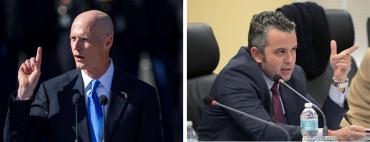
The drama continued between Gov. Rick Scott and Broward Health this week, with a Broward Circuit Court judge ruling Monday that the governor overstepped his authority when he used an executive order and suspended Broward Health chairman David Di Pietro for alleged “malfeasance.”
Scott suspended Di Pietro, who was appointed to the board in 2011, and Commissioner Darryl Wright after Chief Inspector General Melinda Miguel expressed “grave concerns” that board members might be interfering with her investigation on all of Broward Health’s contracts since July 2012.
On Tuesday, Gov. Scott appealed the decision to reinstate Di Pietro. Attorney General Pam Bondi’s office will handle the appeal.
On Monday, Di Pietro called on the governor to lift his Executive Order against Wright, but Tuesday’s appeal of the decision left the future of the two men uncertain. Di Pietro challenged his suspension in a lawsuit four days after Scott suspended him.
Di Pietro said he was confident the original decision would be upheld and called Scott’s appeal nothing more than a “stall tactic.”
This week’s events are just the latest in an epic saga involving federal investigations, state investigations and even death at Broward Health.
Formerly known as the North Broward Hospital District, Broward Health is one of the nation’s 10 largest health systems. It operates more than 30 healthcare facilities, including four hospitals and several clinics serving the people of Broward County north of Griffin Road.
The health system was the center of several controversies in recent months, with state probes into Broward Health as well as a large whistleblower investigation by the U.S. Department of Health and Human Services where agents subpoenaed the health system’s records for information on its contracts with over two dozen doctors.
The investigation, which began in May 2011, quickly became a stain on Broward Health and the hospital district’s board eventually agreed to pay nearly $70 million to end the probe last year. Broward Health then agreed to accept tougher ethics rules over the next five years.
The whopping payment settled the allegations that Broward Health administrations and doctors had conspired in an elaborate kickback scheme in an attempt to defraud Medicare and Medicaid.
A few months later, Broward Health’s president, Dr. Nabil El Sanadi committed suicide, adding another chilling layer to the complications at the organization.
According to the Florida Bulldog, El Sanadi’s suicide happened just weeks after Zimmerman Advertising was negotiating with Broward Health to finalize a $70 million no-bid contract with the agency. A private investigator hired shortly after El Sanadi’s death said the late president was very fearful over his office being bugged due to intense corruption in Broward.
The air of mystery has only seemed to grow following El Sanadi’s death. The late president wasn’t the only one who feared he was being followed or tracked. Earlier this month, Di Pietro said he found a tracking device on his car in February and said he was being followed after leaving his law office in Fort Lauderdale.
"I was being tailed," he told the Sun Sentinel. "I kept seeing the same Ford Taurus."
Following El Sanadi’s death, Di Pietro replaced interim CEO Kevin Fusco and then tried to persuade his fellow board members to fire general counsel Lynn Barrett.
Gov. Scott later suspended Di Pietro upon the recommendation of his chief inspector general, who is currently investigating Broward Health.
Di Pietro planned to return to the Broward Health board Wednesday, but said he wasn’t sure if he would come back based on Scott’s appeal.
Once an appeal is filed from a government agency, the judge must agree to lift the stay, so Di Pietro’s suspension is essentially still pending.
Reach reporter Allison Nielsen by email at allison@sunshinestatenews.com or follow her on Twitter: @AllisonNielsen.


